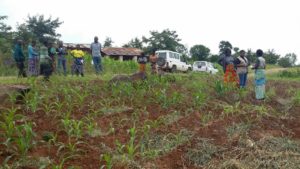Blog
Working with the grassroots to push the national development agenda
Written by Thokozile Munthali
November 19, 2019
Malawi is one of the countries in southern Africa that could benefit from effective and efficient use of resources in ways that positively impact its citizens’ quality of life, half of whom live in poverty. As a Monitoring and Evaluation Officer based in Blantyre district, I inform decisions around the allocation of resources. I can also highlight the positive and negative impacts of these decisions.
Working with communities
I work closely with the grassroots, starting from the identification of problems, to the design, implementation and monitoring and evaluation of projects. This ensures that interventions implemented in the communities meet their specific needs. The participation of grassroots not only encourages ownership, but also guarantees that gains produced during implementation are sustained. This happens even after phasing out of programmes or projects.
Communities play an important role in monitoring interventions implemented in their areas. I have helped different stakeholders develop skills in Community Based Monitoring, so they can track the progress of projects implemented in their communities.
Bridging government and civil societies
The government has an obligation to provide services to meet the needs of its citizens. However, as it is a low-income country, Malawi is unable to meet all its development needs. Development Partners and non-governmental organisations (NGOs) play an important role in development by contributing resources. They also implement different programmes and projects. The role of my office is to highlight the problems in the communities we serve. Furthermore, we generate evidence of what has worked so that partners implement interventions that bring the desired changes.
As an office, we have developed a District Development Plan (2017-2022), which captures issues generated and prioritised by communities. The plan also includes interventions with an attached cost and implementation time frame. NGOs and development partners working in the district have to implement activities in the plan. This arrangement is likely to produce impact since the proposed activities come from the communities themselves. The District Development Plan also aligns with the Malawi Growth and Development Strategy III.
During implementation, my office and the partners work hand in hand with communities to ensure that interventions are implemented effectively. This involves setting and reviewing programme and/or project result areas and targets, monitoring progress implementation, and conducting impact evaluations.
Contribution to shaping National Policies and Strategies
Currently, Malawi is implementing the Malawi Development and Growth Strategy III (2017-2022). The country developed this Strategy based on experiences from a preceding strategy. The current strategy also draws on successes and failures of development initiatives implemented at a grassroots level in the recent years. I have participated in consultative workshops that have shaped the development of the MDGS II and III as someone who works closely with the grassroots.
The Malawi Development and Growth Strategy III connects closely to the Sustainable Development Goals and African Union Agenda 2063. Apart from the MDGS III, the government formulates sectoral policies and strategies through consultations with the grassroots. My office is strategically positioned to provide the necessary information related to different developmental areas in the district.
Challenges I face
My role is affected by the existing work environment, which limits the actual implementation of impact evaluations and the consequent use of results.
The District Councils do not have a harmonised Monitoring and Evaluation System. This hinders the implementation of monitoring and evaluation activities in the district. The absence of a harmonised system means that NGOs and development partners working in the district use their own monitoring and evaluation tools and frameworks. What’s more, some partners are unwilling to share their tools or database with the government. Consequently, my office is unable to report on all development accomplishments registered in the district.
Another challenge is that I have not had enough learning opportunities to gain skills to navigate these challenges, so that I can fulfil my passion of contributing to meaningful development. Therefore this Short course “Evaluation: From Innovation to Impact” will advance my knowledge and skills in impact evaluation, which will help boost my efficiency.
Most partners are willing to provide resources for activities that will likely bring positive impacts, as much as the government is limited in terms of resources to implement impact evaluations, I know with the right skills and knowledge, I will be able to engage development partners to financially support Impact evaluations of programmes and projects implemented in the district. The Impact Evaluations inform decisions on resource allocations on interventions that bring the desired change in our communities. Hence this will contribute to the attainment of the national development agenda.
Thokozire Munthali is a Monitoring and Evaluation Officer based in Blantyre district, Malawi.

